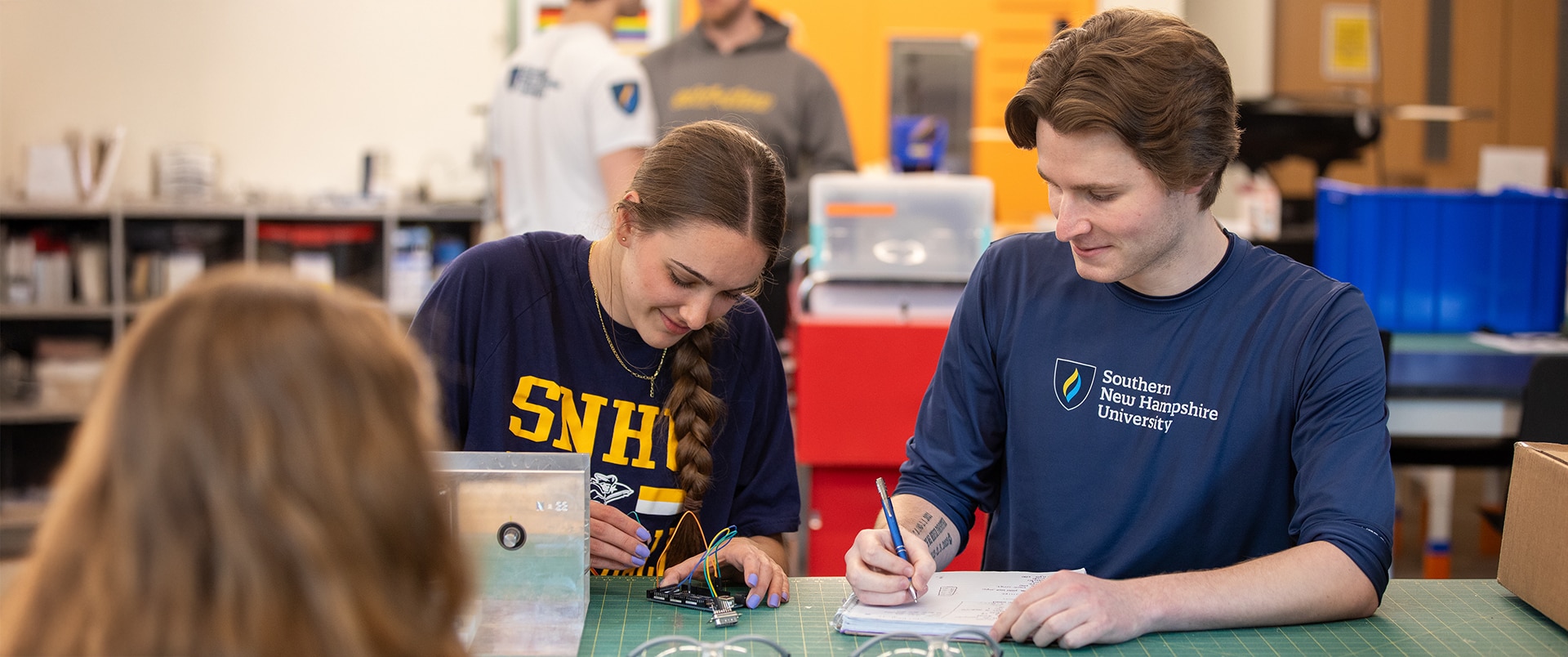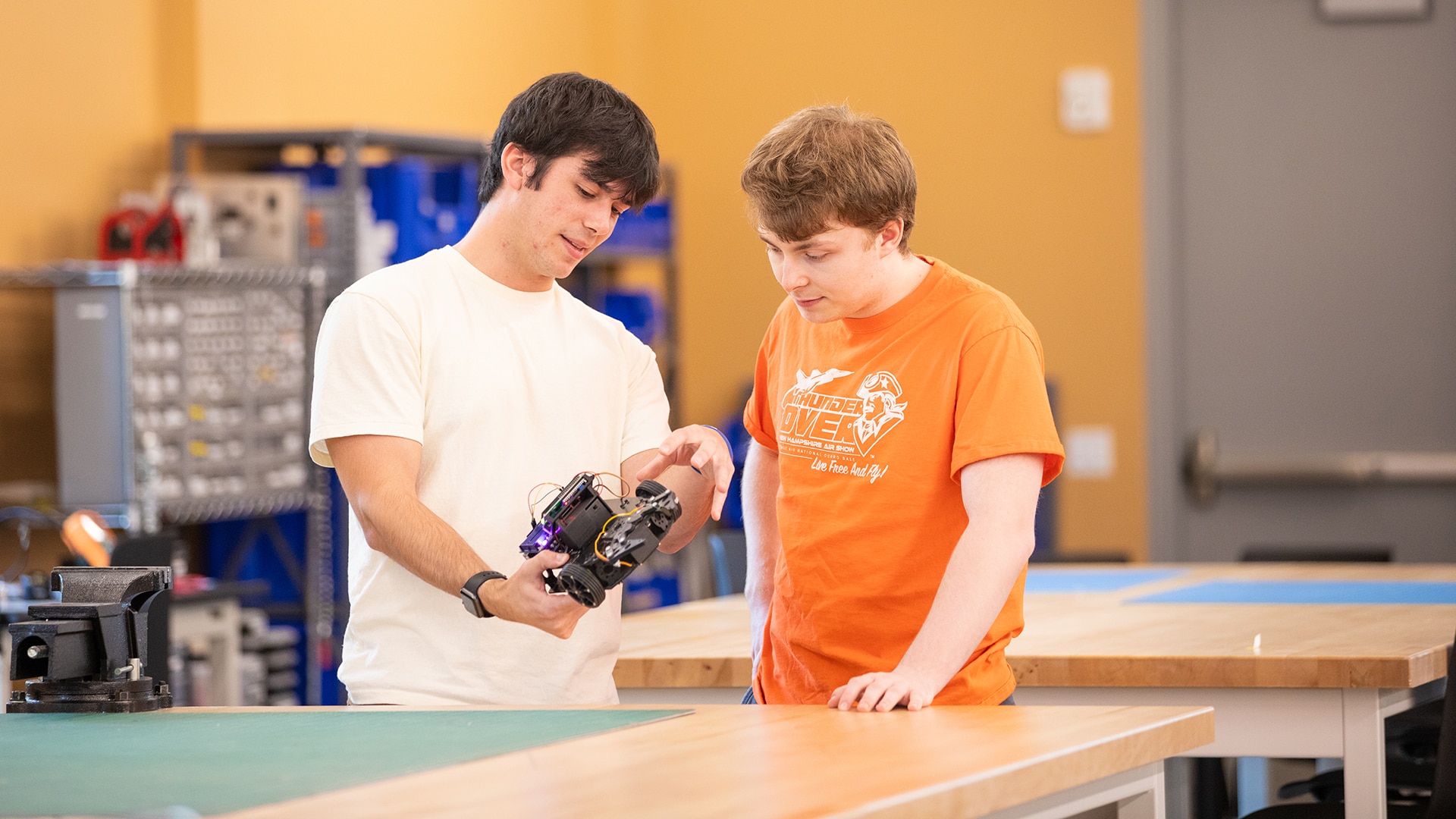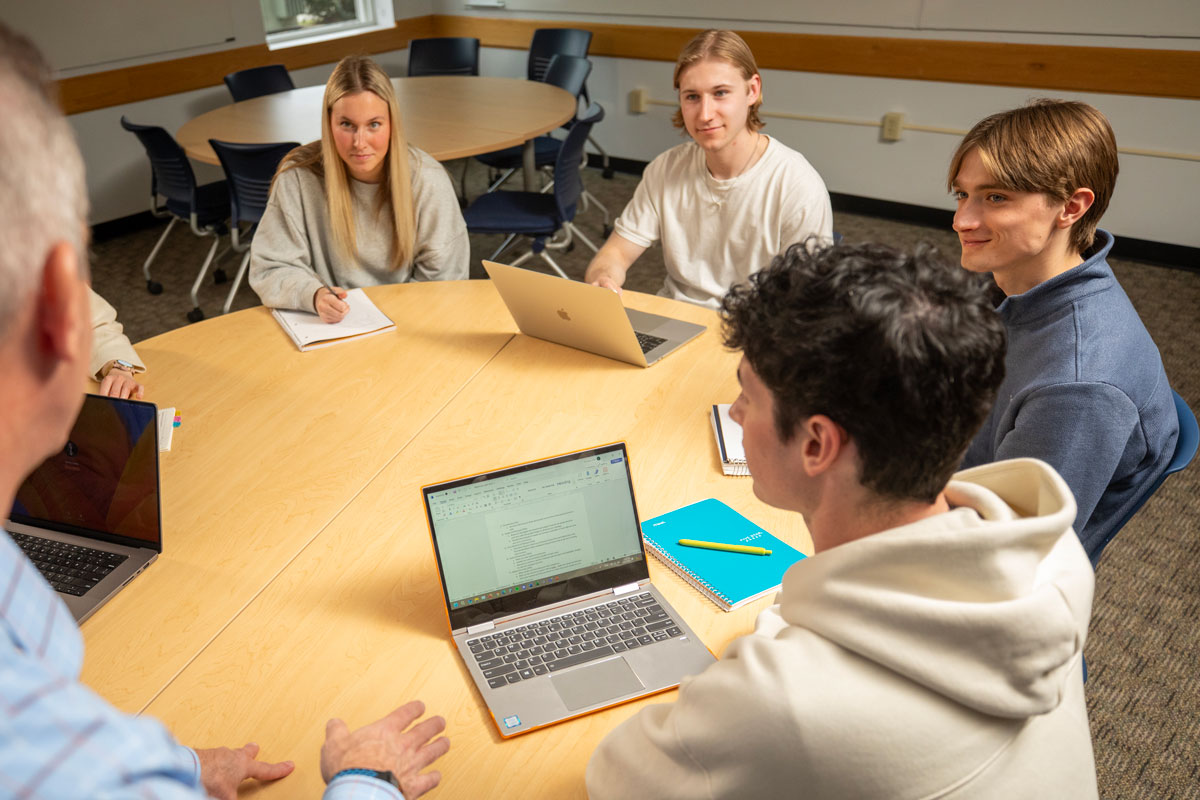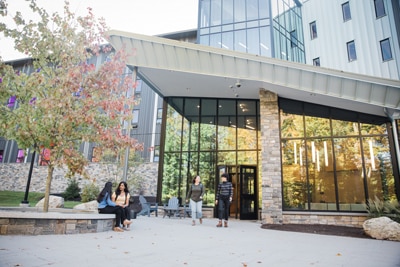Bachelor of Science in Engineering Technology New England campus experience

Program Overview Why get an engineering technology degree on campus?
If you're an outside-the-box, analytical thinker who wants to work with their hands, a Bachelor of Science (BS) in Engineering Technology could be the perfect fit for you. SNHU's on-campus engineering technology program bridges the gap between engineers and skilled technicians. You'll get a strong foundation in graphical communication, electro-mechanical systems, testing and experimentation, process control and fabrication - all to help prepare you for tech-focused roles in a variety of engineering fields.
Skills you'll learn:
- Critical thinking and ethical problem solving
- Modern STEM skills, tools and techniques
- System, component and process design
- Written, oral, graphical and technical communication
- Research and information analysis
- Leadership, emotional intelligence and collaboration

Courses & Curriculum Be the next test engineer with on-campus engineering technology courses
The on-campus engineering technology program curriculum aligns with the international CDIO initiative, a prominent engineering educational philosophy. With this framework as a backbone, the program balances project-based, hands-on learning and traditional, theory-based engineering education.
In your courses, you'll conduct stress, strain and deflection analyses on mechanical structures. You'll study electrical, mechanical, flow and thermal measurement systems. You'll get down to the details, learning the ins and outs of beams, trusses, frames and machines. From designing systems and components to evaluating and implementing processes, you'll build the skills you need to start your career with confidence.
Learn from instructors with industry experience
Our faculty bring with them decades of knowledge and experience in engineering, which informs the development of SNHU's courses and curriculum. They look forward to supporting your journey both in the classroom and as you work toward a career in your field.
Peter Daigneau
Position
Assistant Professor, Mechanical Engineering
Joined SNHU
2020
Education
- MS in Aerospace Engineering from Boston University
- MS in Mechanical Engineering from Rutgers University
- Bachelor of Engineering from Dartmouth College
- Bachelor of Arts in Engineering Sciences from Dartmouth College
Peter Daigneau serves as an assistant professor in mechanical engineering at SNHU. Prior to his current position, Daigneau served as a project/systems engineer at the Smithsonian Astrophysical Observatory (SAO) for over 30 years. He received the NASA Silver Achievement Medal as part of the Parker Solar Probe team for work on the Solar Probe Cup sensor at SAO from 2010 until launch in 2018. Daigneau is the author or coauthor of 7 technical papers, and is a member of the American Institute of Aeronautics and Astronautics.
Jennifer McInnis
Position
Department Chair, Engineering | Associate Professor, Mechanical Engineering
Joined SNHU
2017
Education
- MS in Mechanical Engineering from Worcester Polytechnic Institute
- BS in Aeronautical Engineering from Daniel Webster College
Jennifer McInnis comes to SNHU with years of experience as an engineering project lead, teaching assistant and instructor with institutions such as Daniel Webster College and Worcester Polytechnic Institute. McInnis has industry experience as a manufacturing engineering technician with UltraSource, Inc. She is a member of the American Society of Engineering Educators and the Society of Women Engineers and is currently working toward a PhD in Mechanical Engineering.
To learn more about SNHU faculty, visit our campus faculty page.
Campus major courses
You’ll take major courses that provide you with a solid foundation in your area of study – in some cases featuring experiential or project-based learning opportunities, labs, simulations and internships. These courses will allow you to learn a wide variety of topics and help prepare you for a role in your desired field.
Courses may include:
Visit the course catalog to view the full BS in Engineering Technology curriculum.
Campus general education courses
All undergraduate students are required to take general education courses, which are part of SNHU's newly redesigned program, The Commons. The goal of The Commons' curriculum is to empower you with some of the most in-demand skills, so you can succeed not only in your academic career, but in your personal and professional life too.
Courses may include:
Can’t wait? You don’t have to!
Apply now if you’re ready, and have your decision within 30 days. Or, schedule a visit and come see us in person!
Have questions? Visit our Contact Us page.
Career Outlook What can I do with an engineering technology degree?
When you choose to study engineering, you're positioning yourself for success in an array of industries. Students from this program may go on to work in industries such as manufacturing, healthcare, automotive and more. Maybe you want to be an industrial engineer who designs and tests systems for manufacturing production processes. Or, become a test engineer, conducting assessments that ensure products work properly. No matter where you choose to focus your career, a degree in engineering technology gives you options.
Career paths include:
- Industrial engineer
- Test engineer
- Quality engineer
- Process engineer
Yearly projected job openings, on average, for industrial engineers through 2033, according to the U.S. Bureau of Labor Statistics (BLS).1
Increase in positions for industrial engineers through 2033, projected by the BLS.1
Understanding the numbers
When reviewing job growth and salary information, it’s important to remember that actual numbers can vary due to many different factors—like years of experience in the role, industry of employment, geographic location, worker skill and economic conditions. Cited projections are based on Bureau of Labor Statistics data, not on SNHU graduate outcomes, and do not guarantee actual salary or job growth.

Campus Student Experience So, what’s it like taking classes on campus?
This on-campus program offers project-based classes that focus on independent research skills, teamwork, communication skills and mentoring. With our multi-disciplinary design sequence, you'll collaborate with students from other programs to bring solutions to design problems from concept to implementation. You'll approach engineering technology concepts in a way that's uniquely hands on: complete design projects sponsored by local and national organizations, or learn the intricate ins and outs of machining. You might even choose to practice 3D printing in SNHU's designated Makerspace, which houses equipment, software and tools designed to spark creative inspiration for students of all disciplines.

Student support
At SNHU, you don’t have to do this college thing alone. You’ll have help from your advisor, access to tutoring and office hours, career coaching, and mental health services so you can do your best and feel your best.
Additionally, our Office of Diversity and Campus Accessibility Center make campus a safe place for everyone. Visit our Student Services page to learn more about our support offerings.

Small class sizes
With an average class size of 15-25 (depending on your major) you’ll learn in an environment where professors with real world experience know you by name.
Here, you’re not getting lost in giant lecture halls, but instead, actively participating in thoughtful dialogue where you’re always encouraged to collaborate with your peers and ask questions when they arise.

State-of-the-art facilities
Our 300-acre campus has everything you need. From technology-advanced classroom settings to your dorms complete with fitness centers and hangout spots, our goal is to give you the best college experience possible.
Whether you’re learning in a classroom, in a lab, on the field, or in your field, you’ll have what you need to be successful from the moment you wake up to the moment you close your textbooks.
School of Engineering, Technology and Aeronautics Learn about the School of Engineering, Technology and Aeronautics
In the School of Engineering Technology and Aeronautics, you'll put theory into practice daily. From circuit projects to flight test classes, you'll collaborate with peers, faculty and the community to take on real-world challenges. With a drone-flying arena, unmanned aerial vehicle prep space, wood shop, robotics lab and more, you'll have all the tools at hand to bring your ideas off the page.
How SNHU makes college affordable
At Southern New Hampshire University, we're on a mission to make high-quality education more accessible with more affordable tuition. With 70+ career-focused majors, state-of-the-art facilities, D2 sports and over 70 student clubs and organizations, you can get the campus experience you've always dreamed of at a more affordable price.
Fill out the FAFSA to see if you’re eligible for grants or work-study. (You could also be offered loans, though you’ll have to pay those back later.)
Transfer up to 90 credits toward your bachelor's degree program at SNHU. If you’ve taken one course or many, we’ll evaluate them for you.
Getting free money for college – from SNHU or an outside organization – could help you save hundreds or even thousands of dollars.
Our collaborative partnerships with high schools enhance academic opportunities and college accessibility for some high school students.
Hear from us

Jennifer McInnis, Department Chair, Engineering | Associate Professor, Mechanical Engineering
Accreditations
SNHU is accredited by the regional accreditor the New England Commission of Higher Education (NECHE). The university also carries specialized accreditations for some programs.

Sources & Citations
1Bureau of Labor Statistics, U.S. Department of Labor, Occupational Outlook Handbook, on the internet, at https://www.bls.gov/ooh/architecture-and-engineering/industrial-engineers.htm (viewed Oct. 8, 2024). Cited projections may not reflect local and/or short-term economic or job conditions and do not guarantee actual job growth.
Your dream school is waiting
Apply now or schedule a visit today.


